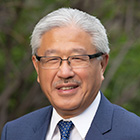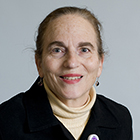Profiles, External Scientific Advisory Board
Victor J. Dzau is the President of the U.S. National Academy of Medicine (NAM). In addition, he serves as Vice Chair of the U.S. National Research Council. He is Chancellor Emeritus and James B. Duke Professor of Medicine at Duke University and the past President and CEO of the Duke University Health System. Previously, Dr. Dzau was the Hershey Professor of Theory and Practice of Medicine and Chairman of Medicine at Harvard Medical School’s Brigham and Women’s Hospital, as well as Bloomfield Professor and Chairman of the Department of Medicine at Stanford University. Read more
From 2012 to 2022, Dr. Bernstein served as the President and CEO of the Canadian Institute for Advanced Research (CIFAR), a global research organization that brings together researchers from around the world to address complex issues of importance to science and humanity. In this role, he developed and leaded the institute’s overall strategic direction, including the development and launching of the pan Canadian AI Strategy, a partnership with the government of Canada, the CIFAR Azrieli Global Scholars program for young investigators and the Global Call for Ideas. Prior to CIFAR, Dr. Bernstein was the founding President of the Canadian Institutes of Health Research (CIHR), Canada’s federal agency for the support of health research. He subsequently became the Executive Director of the Global HIV Vaccine Enterprise in New York, an international alliance of researchers and funders charged with accelerating the search for an HIV vaccine.
He currently is President emeritus, CIFAR and Professor emeritus, Department of Molecular Genetics and Distinguished Fellow Munk School of Global Affairs and Public Policy, University of Toronto. He is a Fellow of the International Science Council.
Dr. Bernstein received his PhD from the University of Toronto and completed postdoctoral work in the UK where he participated in some of the earliest research on the origin of human oncogenes. He has authored over 225 scientific publications, making landmark contributions to the study of cancer genes, stem cells, blood cell formation. He has written 80 opinion pieces for the lay media on science and science policy.
Amongst his honours for his contributions to science are the McLaughlin Medal from the Royal Society of Canada, the Genetics Society of Canada Award of Excellence, the Australian Medal from the Australian Society for Medical Research, induction as an Officer of the Orders of Canada and Ontario, induction into the Canadian Medical Hall of Fame, and the 2017 Henry Friesen International Prize in Health Research. Dr. Bernstein is a member of Canada’s Vaccine Task Force and the Council of Expert Advisors on Biomanufacturing and the Life Sciences. He chairs or is a member of advisory and review boards in Canada, the U.S., U.K., Italy, France, and Australia, and the Science Advisory Board of the Bill and Melinda Gates Foundation. He has received 8 honourary doctorates.
Trained in neurology and molecular biology, over the past thirty years Alexis Brice has developed successful research on the clinical aspects, molecular bases and physiopathology of several neurodegenerative diseases, including Parkinson’s disease, cerebellar ataxias, spastic paraplegias and frontotemporal dementia. His team has identified many causative genes, improving diagnosis and genetic counselling as well as providing new physiopathological insights using cellular and animal models of these diseases. His work has led to the publication of more than 700 research articles in the field of neurology and genetics. Professor of medical genetics at Sorbonne University and a neurologist, he has also shown leadership as former head of the Department of Medical Genetics at the Pitié-Salpêtrière University Hospital, as Director of the Institute for Neuroscience, Cognitive Science, Neurology and Psychiatry at the national level, and now as the Executive Director of the largest neuroscience institute in France, the Paris Brain Institute – ICM, devoted to basic, translational and clinical neurosciences.
Rory Collins is an epidemiologist who studies prevention and treatment of cardiovascular disease in large population-based studies. He trained in medicine at St Thomas’s Hospital, London University, and statistics at George Washington and Oxford universities. He has been at Oxford since 1981, where he is currently Head of the Nuffield Department of Population Health.
During the 1980s and early 1990s, Rory Collins coordinated the ISIS “mega-trials” of the emergency treatment of heart attacks involving more than 130,00 patients. These trials showed that clot-dissolving and clot-preventing treatment could more than halve mortality, rapidly becoming part of routine care worldwide (as well as paving the way for selective use of non-pharmaceutical methods to open coronary arteries).
Since the early 1990s, he has been involved in conducting large-scale randomized trials of the effects of modifying blood levels of cholesterol. For example, the 20,000 patient Heart Protection Study that he led showed that lowering LDL-cholesterol with statin therapy safely reduces the risk of death and disability from cardiovascular disease among a much wider range of people than had been thought likely to benefit. As a consequence, statin therapy is now used extensively worldwide.
He became Principal Investigator of UK Biobank in 2005. Involving 500,000 participants, it is the largest deeply characterized prospective study of disease globally, available for any type of health research. Over 30,000 researchers worldwide use it currently, generating 1,700 papers in 2021 alone.
He was knighted for services to science in 2011, elected to the Royal Society in 2015, and awarded the UK Medical Research Council’s 2020 Millennium Medal for his national and international contributions to both cardiovascular disease and the UK Biobank.
Dr. Gozal is currently the Marie M. and Harry L. Smith Endowed Chair and the Chairman of the Department of Child Health at the University of Missouri, as well as Physician-in-Chief of the University of Missouri Health Children’s Hospital. Dr. Gozal’s research interests include projects such as gene and cellular regulation in hypoxia and sleep disruption, murine models of sleep disorders, and genomic and proteomic approaches to clinical and epidemiological aspects of sleep apnea in both adults and children. In addition, he has pioneered biomarker discovery and machine learning approaches for the diagnosis of sleep apnea across the lifespan. More recently, he has begun exploration of the role of the gut microbiome and circulating exosomes as mechanistic effectors and biomarkers in sleep disorders and associated morbidities.
Dr. Gozal is past president of the American Thoracic Society, the world-leading organization for pulmonary, critical care and sleep medicine. He was a member of the Board of Directors of the Sleep Research Society from 2014 to 2016 and is Deputy Editor-in-Chief for the journal Sleep, as well as Associate Editor for ERJ, Pediatric Pulmonology, Frontiers in Neurology and Frontiers in Psychiatry. He has been the recipient of the ATS Amberson Lecture in 2002 and was awarded the William C. Dement Academic Achievement Award by the American Academy of Sleep Medicine in 2013 and the 2016 Lifetime Achievement Award of the National Sleep Foundation. He has also received two honorary doctorates from the University of Barcelona and University of Lleida in Spain. His research has been continuously supported by grants from the NIH since 1992. He has published over 800 peer-reviewed original articles carrying an H index of 129 and over 70,000 citations (one of the top 2,000 most cited scientists in the world), along with more than 175 book chapters and reviews. He has also edited four books, presented more than 1,000 scientific abstracts, and lectured extensively all over the world.
An NRF A1-rated scientist, CEO and President of the South African Medical Research Council (SAMRC), Professor Glenda Gray is a qualified pediatrician and co-founder of the internationally recognized Perinatal HIV Research Unit in Soweto, South Africa. Prior to her appointment at the SAMRC, she was the Executive Director of the Perinatal HIV Research Unit, an affiliate of Wits University.
Glenda Elisabeth Gray’s global profile includes a role as Co-PI of the HIV Vaccine Trials Network (HVTN), a transnational collaboration for the development of HIV/AIDS prevention vaccines. She is also Director of International Programmes for HVTN, Chairperson of the Board of the Global Alliance for Chronic Diseases, and a member of the Institute of Medicine of the National Academies, USA.
She received South Africa’s highest honour ─ the Order of Mapungubwe ─ for her pioneering research in PMTCT. Other prestigious accolades include the Nelson Mandela Health and Human Rights Award for significant contributions in the field of mother-to-child transmission of HIV. Selected as one of Time’s 100 Most Influential People in the World, Glenda is a recognized leader in her field. Her qualifications include an MBBCH, FCPaeds (SA), DSc (honoris causa SFU), DSc (honoris causa SUN), LL.D (Rhodes).
Julie R. Ingelfinger, MD, is a professor of pediatrics at Harvard Medical School, senior consultant in pediatric nephrology at MassGeneral Hospital for Children at Massachusetts General Hospital, and a deputy editor of the New England Journal of Medicine. She has been a consultative pediatric nephrologist, hypertension specialist and mentor in these areas for several decades. Her commitment to teaching is reflected in the multiple awards she has received. These include the Henry L. Barnett award from the American Academy of Pediatrics (2009), the Founders Award from the American Society of Pediatric Nephrology (2012), the National Kidney Foundation’s Honors Award (2018), and an alumni achievement award from Albert Einstein College of Medicine (2018).
For many years, Dr. Ingelfinger has been involved in studies of the intrarenal renin angiotensin aldosterone system (RAAS), perinatal programming, and the interaction of the coagulation pathways and microvascular disease. Her current projects focus on the role of the intrarenal vasoactive pathways in disease states and the role of maternal nutrition in kidney development and perinatal programming.
Interested in innovative ways to teach writing and communication, Dr. Ingelfinger has been an editor of the textbook Pediatric Hypertension, in each of its 4 editions.
Calum MacRae, MD, PhD, is Professor of Medicine at Harvard Medical School, Vice Chair for Innovation in the Department of Medicine at Brigham and Women’s Hospital (BWH), an Associate Member at the Broad Institute of Harvard and MIT and a Principal Faculty Member at the Harvard Stem Cell Institute. He was previously Chief of Cardiovascular Medicine at BWH.
He co-directs the Genomic Medicine Program at BWH, is a member of the Cardiovascular Clinical Genetics Center and is an investigator in the Harvard Undiagnosed Diseases Center. Dr. MacRae is the Director of One Brave Idea, a program to transform translation, initially in atherosclerosis, that is funded jointly by the American Heart Association, Verily Life Sciences and AstraZeneca, with support from Quest Diagnostics. He is also the principal investigator of the Apple Heart & Movement study and directs an NIH-funded basic science group focused on the developmental basis of disease and phenotype-driven drug discovery.
Nicolas Padoy, PhD, is a professor of Computer Science at the University of Strasbourg in Alsace, France. He is also Scientific Director and Director of Computer Science and Artificial Intelligence Research at the Institute of Image-Guided Surgery (IHU) of Strasbourg. He is a pioneer in the field of surgical data science and artificial intelligence (AI). His work investigates how to exploit multimodal data from pre-, intra- and post- operative processes to make surgical procedures safer, more efficient and more accessible by designing novel cognitive assistance and human-machine cooperation systems for the operating room.
Nicolas Padoy's research has been supported by multiple competitive grants from the Agence nationale de la recherche (ANR) and the European Union. In 2015 he was awarded the Guy Ourisson Prize by the Cercle Gutenberg, which recognizes promising young researchers in Alsace, and in 2021 he was awarded a national AI Chair by the ANR for his project AI4ORSafety that aims to improve safety during laparoscopic procedures by enforcing safety checkpoints via artificial intelligence.
Nicolas Padoy was Program Chair of the 2021 MICCAI International Conference on Medical Image Computing and Computer Assisted Intervention and is General Chair of the International Conference on Information Processing in Computer-Assisted Interventions (IPCAI) for 2023-2025. He is the co-founder of an international summer school on surgical data science, which trains a multidisciplinary group of clinicians and computer scientists to jointly develop computer-aided tools of clinical value.
Vice-Dean Research and Innovation and since 1990 professor at the Faculty of Medicine of Université Laval, senior scientist the CHU de Québec-Université Laval Research Center. He was the chairholder of the Canada Research Chair in oncogenetics (2001 to 2022). His pioneer work led to the discovery of the complete structure of the cancer susceptibility gene BRCA2 and furthered our understanding of BRCA1 gene mutations in Canadian families in Canada in the mid-1990s. Director, since 2001, of one of the largest interdisciplinary and international teams on genetic susceptibility to breast cancer. He played a key role in several international studies. For instance, He led two large-scale international applied projects entitled: Personalized Risk Stratification for Prevention and Early Detection of Breast Cancer (PERSPECTIVE, 2013-2018) and the PERSPECTIVE: Integration and Implementation (PERSPECTIVE I&I; 2018-2024) designed to generate real-world evidence on acceptability, uptake, cost-effectiveness, organizational readiness as well as on socio-ethical and legal issues, for the implementation of a risk-stratification approach to tailor breast cancer screening depending on an individual’s risk at the population level. He is an author of 530 publications.
He received numerous accolades by his peers, including the Richard E. Weitzman Award from the Endocrine Society, the ACFAS Léo-Pariseau Award, the Scientific/Medical/Research Award from the Quebec Breast Cancer Foundation, the Prix du Québec Wilder-Penfield, the highest distinction awarded by the Quebec government in the biomedical field, the Michel Sarrazin Prize from the Quebec Clinical Research Club, the Grand Prix Scientifique from the Quebec Breast Cancer Foundation and the O. Harold Warwick Award from the Canadian Cancer Society. He also received a Doctorat Honoris Causa from the Université Côte d’Azur. He is a Fellow of the Royal Society of Canada, the Canadian Academy of Health Sciences and the Académie des Grands Québécois.
He has played a significant role in the strategic organization of health research in Canada, through his participation in more than fifteen councils and advisory committees, including the Governing Council of the Medical Research Council of Canada (1998-2000), CIHR Institute of Gender and Health Advisory Committee (2001-2004), Health Canada Ministerial Science Advisory Council (2005-2011), the Board of Directors (2005-2010) of Genome Canada and as Chair of the Science and Industry Advisory Committee of Genome Canada (2010-2016). He is currently Chair of the Research Committee of the Réseau Québecois de Diagnostic Moléculaire of the Ministère de la santé et des services sociaux du Québec. Since 1999, he has served on the Fonds de solidarité FTQ's Innovation et Capital de Risque investment committee, one of the largest venture capital investors in the life sciences sector in Canada.
Dr. Siu is a senior medical oncologist at Princess Margaret Cancer Centre since 1998, and has been a Professor of Medicine at the University of Toronto since 2009. She is the Director of the Phase I Program and Co-Director of the Bras and Family Drug Development Program at Princess Margaret Cancer Centre and holds the BMO Chair in Precision Genomics (2016-2026). She is also the Clinical Lead for the Tumor Immunotherapy Program at Princess Margaret Cancer Centre. Dr. Siu served on the Board of Directors for the American Society of Clinical Oncology (ASCO) for a four-year term (2012-2016). She also served as a member of the Nomination Committee for the American Association for Cancer Research (AACR) (2014-2016) and on the AACR Board of Directors for a three-year term (2017-2020).
Dr. Siu’s major research focus is in the area of new anticancer drug development, particularly with respect to phase I trials and head and neck malignancies. She is the Principal Investigator of a phase I cooperative agreement UM1 award sponsored by the United States National Cancer Institute. In addition to her active research in early phase clinical trials, she has been leading genomics initiatives and immuno-oncology trials at the Princess Margaret Cancer Centre. Together, the three programs of drug development, cancer genomics and tumor immunotherapy form a triad of synergy that supports the institution’s core vision to deliver precision cancer medicine.
Internationally, Dr. Siu was the recipient of the U.S. NCI Michaele C. Christian Award in Oncology Drug Development in 2010. She has been awarded the TAT 2020 Honorary Award for contributions in the development of anticancer drugs. Locally, she was awarded the University of Toronto Department of Medicine Eaton Scholar Researcher in 2016. She was the ASCO Conquer Cancer Foundation Grants Selection Committee Chair in 2009-10. She was Chairperson of the AACR Education Committee, Co-Chairperson of the Scientific Committee for the 2012 Annual Meeting and Co-Chairperson for the Clinical Trials Committee 2015-2017. Dr. Siu has published over 370 peer-reviewed manuscripts. She is currently the Editor-in-Chief for AACR’s newest journal, Cancer Research Communications, a scientific editor for Cancer Discovery, and on the editorial board for JAMA Oncology, Cell and Cancer Cell.











